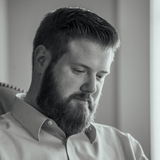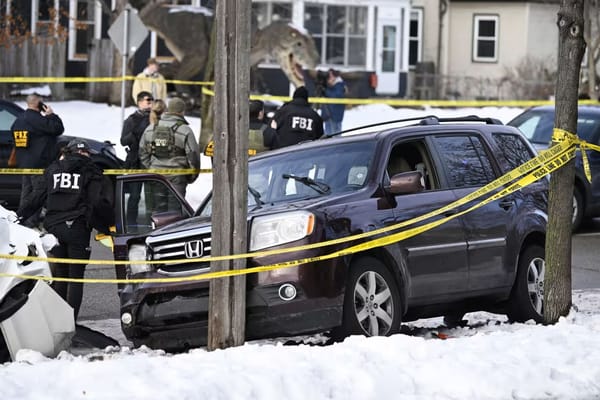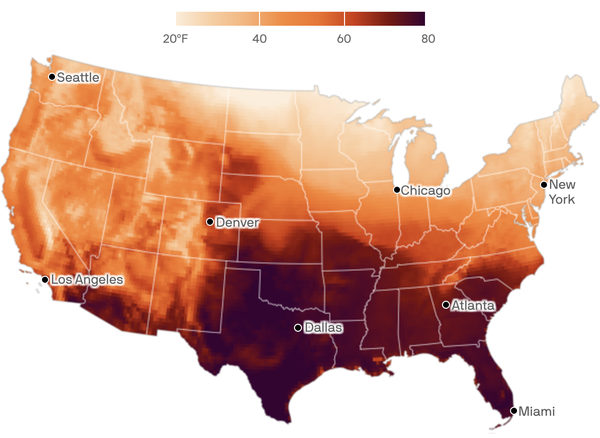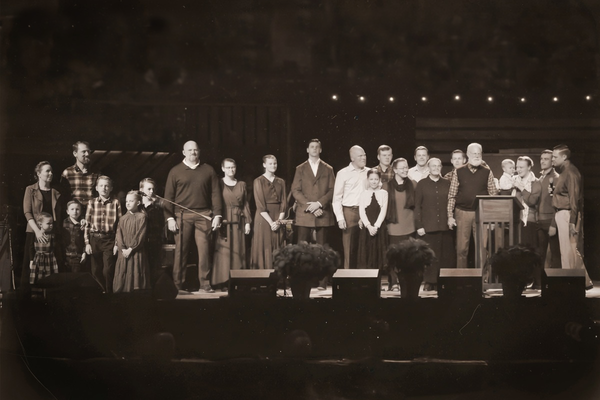The Garden Isn’t Enough
Each generation can pass something better to the next—but not by accident. Grace must be real. Surrender must be total. We’re not raising children by osmosis. We’re passing batons on a long road back to Zion—where humility, truth, and love grow stronger with each step.
Why Our Children Still Need a Miracle
The Soundtrack of a Life Unfolding
One of the quiet joys Rebekah and I share on many nights before we go to sleep is the sound of piano notes floating up from the living room below. It’s our sixteen-year-old daughter, Aviva, playing her heart out before bed. The chords rise like prayers, vibrating through the walls, through our hearts.
Often, I’ll stop reading or editing and simply gaze off, sometimes locking eyes with Beck as we both silently acknowledge the same thing: a deep, inexplicable pride and tenderness for the girl downstairs, for the beauty of her becoming.
I still remember the first melodies she composed when she was just seven. I still have the scratch recordings we made together—lyrics she mostly wrote herself, with a few tweaks from Dad. No, they’re not Grammy material. But to me, they’re treasures—etched in memory and spirit.
This past week, the song we heard drifting upward was different. A new tune. New words. Scripture set to melody—verses about trust and waiting on the Lord. Two days later, with some gentle coaxing, she shared the song in full. And that familiar ache—that sacred swelling of the heart when your child begins to transcend their lower instincts and rise toward grace—welled up again. I grabbed my phone and recorded her newest piece, just like I’ve been doing since she was two.
Later, I played it for her grandmother. Her emotional response made mine seem dry by comparison.
The Sacred Task of Parents
As parents, we know our children’s needs more intimately than anyone else—their fears, their insecurities, their aspirations, their pride. And yet, more than knowledge or insight, what guides us is something deeper: an unspoken sense of divine purpose. We know—if only dimly—that for a season, God has entrusted us with a soul. A precious, unfolding life.
And in our better moments, we sense that our task is not just to love and protect, but to steward. To shape and guide. If our children grow into servants of love—into givers, not takers—then we have succeeded. If they rise beyond self and toward the betterment of others, then we’ve fulfilled our part—not just as caregivers, but as spiritual midwives of a purpose-filled life.
No one can fulfill this task like a parent. We are the most invested. The most committed. The most acquainted. The most prayerful. The most tender. At least this is true of parents who love with God’s love.
The Fatherhood of God—and the Tragedy of Its Counterfeit
And so, when we hear that God is a Father, we’re either comforted or confused.
For some, it’s a word of assurance. A promise of love and joy, firmness and guidance, correction and acceptance—all in one. It calls to mind laughter and games, hard work and delight, discipline and gentleness. It stirs a longing deeper than words. This is the unmatched treasure of being raised by godly parents—fathers and mothers who, by grace, become channels of the divine.
But in a broken world, far more often than we like to admit, the word “father” evokes something else. Cruelty. Neglect. Capriciousness. Abuse. Selfishness. Fear. And those who come from such devastation are not to blame for the twisted framework that was grafted into their minds. They did not choose the meaning that was burned into them.
But they do need to be grafted into something new.
They need a family—a church—that redefines the terms. That restores meaning. That models a love so consistent, so costly, so faithful, that the old definitions begin to crack and fall away. And that only happens through incarnation. Through presence. Through patience.
Through risk.
Because loving the wounded means being wounded in return. Their pain will echo. Their fear will lash out. And only the kind of love that never quits, never gives in, and is rooted in the sacrifice of the God who gave all can endure that storm—and turn it into healing.
A Family That Redefines the Terms
And this is the beauty—and the meaning—of the church family: a place where God enters the broken forms others have mangled and redefines them. Where the words “love,” “trust,” “father,” “friend” begin to take on new meaning. Where, in time, we can hardly remember what those words used to mean—because grace has transformed everything, and all things have become new.
But this kind of transformation doesn’t happen overnight. It is a journey—this becoming the family of healing. It takes more than programs or doctrine. It takes the terrifying vulnerability of choosing to love when love hasn’t been returned. It takes the patient endurance of seeing the wound behind the wound and refusing to quit.
It takes courage.
And it takes a people—a community of believers—willing to be part of the long, redemptive process of redefinition.
A Better Inheritance, Generation by Generation
My daughter has supports and opportunities I didn’t have. And I had far more than many of my relatives in the broader culture. Still, it’s better in the second generation than the first—and better in the third than the second.
We’re not just running in circles. We’re not on a looping racetrack, each generation starting over at the same point. No, this is a relay marathon in one persistent, ascending direction. And when the baton is passed faithfully, something incredible happens: wisdom deepens, grace compounds, strength multiplies.
We build on the sacrifices and breakthroughs of the generations before us. We’re not stuck in their mistakes—we’re learning from them. Not because we’re better, but because we’ve chosen to stay connected—to be an extension of their journey. We continue what is right, we learn from what was wrong, and in that humility, wisdom compounds across generations. We are “pressing on toward the upward call of God in Christ Jesus,” and every faithful mile marker they reached becomes the platform for the next.
And yes, I marvel at the spiritual and cultural inheritance my children are receiving—but I hold no illusions. There is no environment, no culture, no support system so perfect that it can in itself overcome human nature. Brokenness runs deeper than circumstance. Depravity is not canceled by context.
That’s one of the hardest-won truths we’ve had to learn as a people.
From the World to the Garden
Our first generation came straight from the world. From broken homes. From addiction and heartbreak and violence. They were adults when grace broke in—decisively, suddenly, completely. They surrendered. They were transformed. And the change was unmistakable.
Yes, sanctification continued to unfold over time. But there was a clear threshold—a moment of new birth. No going back. No halfway. The light turned on.
Many in that generation would tell you they initially assumed their children’s conversions would be far more swift and painless than they turned out to be. They believed the miracle of transformation would simply repeat—perhaps even earlier, perhaps even easier—because of the beauty of the culture they now lived in. They assumed that raising children in Christian homes would naturally produce Christian children—an assumption shared by many sincere believers, but an assumption nonetheless, and often an unexamined one.
They imagined that culture and community would nurture their children into faith by osmosis.
But the reality was jarring. The early years of our fellowship’s second generation were full of painful surprises—frightening revelations that exposed a hard truth: even in the garden, beasts are born.
Beasts in the Garden
Every parent wants to see their child as wonderful—and to a point, that’s legitimate. Every human being is made in the image of God, with the capacity for immense good. But every human being is also shaped by a fallen world and corrupted by the depravity of sin. Parents who viewed their children as inherently good—who believed every problem came from outside influences—were in for a rude awakening. We are all more inclined to notice the external contamination than to confront the internal brokenness. Many parents pulled their children out of schools plagued by bullying, violence, and perversion, thinking a beautiful environment would be enough. It wasn’t.
But their children, yet unchanged by the miracle of true transformation, manifested their brokenness in the garden, often bringing disturbing hurt on themselves and those around them.
When disturbing manifestations of sin began to surface—cruelty, selfishness, even moral degeneracy—some first-generation parents told themselves it was an anomaly. A tragic exception. Surely it wouldn’t happen again. Perhaps this was just an unusually rebellious child.
But the problems kept coming. And they weren’t flukes.
Again and again, the truth became undeniable: every human being is broken. Every soul needs a Savior. No amount of separation from the world can redeem a heart that has not fully surrendered to God.
Over time, the community began to see more clearly. They had inherited from other Christian traditions the belief that children could be born again, baptized, and converted at very young ages—often even before adolescence. And for a while, that belief shaped their practice.
But eventually, they paused. They began asking hard questions. And by God’s grace, they found the humility to change.
They were blindsided—but they didn’t stay blind. They searched the Scriptures. They examined their hearts. They re-evaluated their assumptions. And they corrected course.
They came to see that too much trust had been placed in youth who had not yet proven trustworthy—that innocence and sweetness were not the same as character and salvation. That even children raised in godly homes are only truly safe when fully covered by their parents’ authority, oversight, and spiritual protection.
And so, in the mid-1990s, a shift began—a wise and sobering adjustment, born from shattered illusions and redeemed through truth.
Facing the Truth About Human Nature
One of the most painful lessons a parent can learn is this: if you expect your children to be righteous, kind, and loving before they’ve been transformed by grace, you are setting yourself up for heartbreak. And when they prove the opposite—when they’re cruel, selfish, reckless, even destructive—you’re not just hurt. You’re devastated. Doubly so.
And in that devastation, most parents overreact. They panic. They clamp down in fear. They become too strict, too extreme—thrashing about in desperation to stop the chaos, to escape the shame, to get back to the illusion of “normal.”
This, tragically, is the story of many in Christian circles. They rightly identify the school system, entertainment culture, and modern social spheres as fermenting depravity. But then they wrongly conclude that these outside influences are the root cause of their children’s failures, rather than recognizing the corruption native to every human heart.
So they double down. Sometimes they move out into the middle of nowhere. They isolate. They control all inputs—every book, every screen, every influence. But lo and behold, instead of producing paragons of righteousness, they often reap an exaggerated version of the same corruption they tried to avoid.
This is the lesson Christians must take from the very first story in the Bible. The first family lived in paradise. Perfect food. Perfect mate. Perfect parent. Endless peace, harmony, and life. And yet—there, in perfection—they found the one forbidden thing and chose it.
Hear, O heavens, and give ear, O earth! For the LORD has spoken: “I have nourished and brought up children, and they have rebelled against Me” (Isa. 1:2).
That is the revelation: no environment, however flawless, can resolve the human condition. Culture and context matter—but only as a secondary grace. They are not the source of transformation. The new birth comes only through repentance, through grace, through the miracle of Calvary.
And tragically, when the delusion begins to collapse, many parents don’t take responsibility. Instead, they point the same finger they once aimed at the world—only now they turn it on the church. On those who loved them, served them, supported them. They blame the community, the vision, the hope they were once fed by.
But the problem is not the support—it’s the misplaced emphasis. It’s the order of priorities. They placed their hope in the support as if it were the source of grace, not the environment for the source to take root. And when the miracle of grace didn’t occur, they blamed the soil instead of grieving the lost seed.
But there is another way.
Pastors and mentors, like sincere parents, can easily mistake external conformity for true transformation. In their anxious efforts to fix problems, they may tighten control or enforce stricter rules, producing outward compliance without inward renewal. But God is not seeking conformity; He is seeking transformation.
No structure, however godly, can replace a profound revelation of sin and a deeply personal encounter with the Savior. Salvation cannot be engineered.
Teaching right principles and modeling good habits may shape behavior, but without surrender, grace, and the inspiration of the Holy Spirit, it produces performers—not disciples. Without the cross, all we can hope to build is an empty form. But the Spirit gives life—rising from the empty tomb, where pride and human effort die in the freedom and trust of self-surrender.
When your mind is renewed—when you face the truth that your children, like all of us, are born broken and will remain so until Christ takes hold of them—then you are not shaken by their failures. You don’t unravel. You don’t spiral into fear and control when they manifest a fallen nature. You stay anchored.
You respond not with panic, but with patience. Not with despair, but with strategy.
Looking back, we can see how our community struggled through a strange paradox in the 1980s and ’90s. On one hand, we were far too naive—believing our children would thrive by osmosis in the beauty of a godly environment. On the other hand, when their fallen natures manifested with unexpected intensity, we sometimes reacted with too much fear, uncertainty, panic and control.
Now we know why.
Here is the grace that season taught us: never be naive about the human condition. The Fall is universal. It ravages every structure—corporate, educational, legal, social—and it also creeps into churches, homes, and threatens even the hearts of those who love God most.
The weakness lies in thinking you can escape the battle.
The strength is in knowing you must confront it—and being ready.
So when the brokenness surfaces—and it will—you’re not dismayed. You don’t harm others in your panic. You don’t damage your child’s fragile trust in God. You hold fast.
You respond with grace. With vision. With steadfast love. And with the wisdom born of truth.
A Hard-Won Wisdom
Our parents began to say it plainly: “Don’t take chances. Assume things will go wrong—especially among the young and unconverted. Be vigilant.”
We started to set more safeguards. We educated our children more proactively about sexuality. We no longer assumed that peer interaction was neutral—or safe—without adult presence and mature oversight.
We taught ourselves to see that youthfulness is not goodness. That children are not automatically good for each other. That peer culture, even in a clean context, can still be destructive. That no external influences are needed for every expression of human brokenness to manifest.
Only when a young person has experienced true conversion—when they have taken personal responsibility for their thoughts, actions, and relationships—only then are they ready to walk in the freedom of community life.
And such a conversion is not even possible for a prepubescent child, no matter how sincere they may be. So imagining that a childhood experience with God—no matter how beautiful or profound—equates to repentance and a full conversion only leads to disappointment and confusion when that child later faces the turmoil of adolescence.
The adjustments we made were not shallow rules or rigid codes. They were the fruit of painful trials. They were formed in the fire of love—the kind that won’t let a child walk off a cliff just because everyone else is.
People look at our practices and assume they are peculiar preferences. But they are not. They are forged convictions. Each one hammered out through grief, disappointment, and the humility to change. We do what we do because we lived what we lived—and we refuse to repeat it.
The Fight Continues
And we’re not done.
We’ve got to keep fighting. Keep adjusting. Keep struggling against the tide. Because when you walk against the grain—when you choose a path out of the mainstream—you attract heat. You make yourself an easy target for the unscrupulous. For those looking for someone to blame.
All the while, we are bringing in new families. Scores of them. People who didn’t grow up like we did. Who weren’t there when we learned the hard lessons. Who don’t yet realize how broken a child can be—even when raised in a beautiful, godly environment.
And now they face a choice.
They can reinvent the wheel. Or worse, they can reinvent the pain and agony of our first generation—by ignoring the wisdom bought with blood and tears.
Or—they can join us on this path of faithfulness. They can pick up the baton where the last runners left off and walk in the fruit of humility, discipline, and proactive love. They can choose not to learn everything by firsthand failure, but to inherit hard-won wisdom—and build something stronger still.
The Long Road Back to Zion
So when I hear my daughter play the song she wrote—when I hear the chords and the Scripture and the depth of feeling—I am moved not just by her musical gift. Not just by her progress or poetry.
I’m moved by what it means.
I feel a gratitude that she is inheriting something better than I had—even though I had so much more than what my parents had. And I feel a hope that one day, she’ll pass something better still to her children.
And in that moment, I glimpse the dream still alive.
Another milestone passed. Another stone set on the long road back to Zion—back to hope, back to peace, back to love.
But let’s not fool ourselves. This is not utopia. Anyone who thinks that community alone will raise your children is delusional. Environment is not enough. Even the most beautiful culture cannot transform a heart.
Your children—my children—are just as lost without Christ as anyone else. Whether they’re in public school, private school, home school, or juvenile detention, they are broken human beings in desperate need of a Savior.
Only grace can do the miracle. Only love can claim the heart.
Seed and Soil—but Not the Same
But once that miracle happens—once grace has done its work in the heart of a young man or woman—then the culture of the church, the beauty of community, becomes fertile soil. The environment doesn’t conceive the life, but it sustains it. It doesn’t create the seed, but it nourishes its growth.
Still, we must never confuse the two.
The seed is Christ. The transformation of the heart and mind by His Spirit and truth—that is regeneration. That is salvation. And that alone is the foundation. Without that, everything else becomes empty shell, imitation, shadow.
Culture is a work of grace—but it is a secondary work. It can’t replace the new birth. It can’t substitute for surrender. A godly context may support growth, but it cannot create God’s life in a soul. It may protect from some destructive outside influences, but it cannot transform the destructive inside influence. And when we confuse the culture with the conversion, we create a dangerous illusion. We raise beasts in gardens and call them saints.
We must tell the truth. Always.
The miracle of God’s love must be real. The repentance must be genuine. The transformation must be total. Then—and only then—will the beauty of the church become more than a setting. It will become a home. A greenhouse for the fruit of righteousness. A field for the harvest of a new humanity.
This is the journey we’re on.
And as I hear my daughter’s song echo through the house, I feel it again: we’re getting closer. Grace is still at work. The road is still unfolding. And the dream is still alive.
Let us not grow weary. Let us not grow proud. Let us not forget the price that was paid to get here.
And let us raise the next generation with the humility, vigilance, and hope of those who remember—who believe—and who still press on toward Zion.





